This video was posted to reddit recently. It should be required viewing for anyone involved in education.
p.s. I am sticking with this blog title, even though the speaker questions if "uncritical" thinking is a non-sequitur.
Update: 2011-05-01
Terry Gross interviewed Diane Ravitch this week on Fresh Air (mp3). She spoke against rating teachers' performance using their students' test scores.
She also interviewed Andrew Rotherman (mp3), who defended the charter school model.
Saturday, April 30, 2011
Thursday, April 28, 2011
New Slackware Version Released
I've been running Slackware -current for the last few months, with mixed success due to issues with the kernel on my hardware. I hope those have been resolved because -current has just been marked as the next stable version, 13.37. This new version updates version 13.1, but is more elite.
I will probably go with a 2.6.38.x kernel. Also, I am sticking with Firefox 3.6.x for now. The new Firefox version "moves the furniture around" quite a bit, and will take some getting used to.
- Choice of kernel version
2.6.37.6 in the "a" series, or
2.6.38.4 in testing - gcc 4.5.2 compiler toolset
- glibc-2.13
- XFCE 4.6.2
- Firefox 4.0
I will probably go with a 2.6.38.x kernel. Also, I am sticking with Firefox 3.6.x for now. The new Firefox version "moves the furniture around" quite a bit, and will take some getting used to.
Wednesday, April 27, 2011
More bad karma for Sony
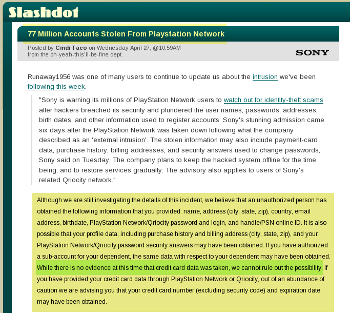 .
.Perhaps, Sony could've spent a little more time on their own security, instead of wasting time locking out Linux users.
Update: 2011-05-01
A lot of news outlets covered this story, and named it the worst data breach in history. It was a featured story this week On the Media. Here is a link to the (mp3).
Sunday, April 24, 2011
Definitive Seymour Cray quote
My last post (about Artificial Intelligence) reminded me of this quote from Watson's namesake:
Cray's response:
This retort is right up there with the best from Franklin, Twain, or Churchill.
Update: 2011-04-25
I like the above quote best because it shows that small teams can have major successes, and that bloat/creep/unrealistic design parameters set by management sink projects. A good example is MS Vista. That project finally did see the light of day as a shipping product, but not without much consumer consternation.
Another good example of how small teams can do more with less is aircraft designer, Kelly Johnson's skunkworks operation. Whenever corporations get involved, costs go up and likely success rate goes down. A project can fall into the abyss at the heart of the military industrial complex. At least, Lockheed saw the wisdom in keeping some "back of the envelope" design guys on staff.
I'll end with one more Cray quote:
This was in response to a question why the CDC 6600 computer's memory systems didn't originally include memory parity (verification). Later, when the feature was added back in on later designs, he said the following:
Last week Control Data announced the 6600 system. I understand that in the laboratory developing the system there are only 34 people including the janitor. Of these, 14 are engineers and 4 are programmers. Contrasting this modest effort with our vast development activities, I fail to understand why we have lost our industry leadership position by letting someone else offer the world's most powerful computer.
--Thomas Watson, Jr., IBM CEO, August 28, 1963
Cray's response:
It seems Mr. Watson has answered his own question.
This retort is right up there with the best from Franklin, Twain, or Churchill.
Update: 2011-04-25
I like the above quote best because it shows that small teams can have major successes, and that bloat/creep/unrealistic design parameters set by management sink projects. A good example is MS Vista. That project finally did see the light of day as a shipping product, but not without much consumer consternation.
Another good example of how small teams can do more with less is aircraft designer, Kelly Johnson's skunkworks operation. Whenever corporations get involved, costs go up and likely success rate goes down. A project can fall into the abyss at the heart of the military industrial complex. At least, Lockheed saw the wisdom in keeping some "back of the envelope" design guys on staff.
I'll end with one more Cray quote:
Parity is for farmers.
This was in response to a question why the CDC 6600 computer's memory systems didn't originally include memory parity (verification). Later, when the feature was added back in on later designs, he said the following:
Farmers buy a lot of computers.
Saturday, April 23, 2011
AI
This winter's Jeopardy match between Rutter, Jennings, and Watson is more evidence we are at the threshold of a new world where computers will take an even larger role. We've come a long way from the Eliza bot. I suspect this trend will continue, with the Jeopardy victory spurring along the next phase of development. I see the next phase moving AI entities, like Watson, onto the internet. The entities will be "powered" using spare compute cycles that are provided by overcapacity at data centers. These spare cycles will become cheaper and cheaper as more massive data centers come online and as Moore's Law continues to deliver more and more performance per watt. This overcapacity will allow the "bots" to "live off the fat-of-the-land."
I think the next phase of development will exist as internal computer structures first. This avoids solving problems in a different solution space (i.e. navigating physical reality.) For sure, there is demand for marrying the two (AI + robotics). Our collective imagination has already been primed by characters like Frankenstein (in literature), and from the first scifi film from 1927. "False Maria" from the film (Metropolis)
 .
.
set the stage for derivative characters like Jude Law's Gigilo Joe in AI. The Jeopardy match would have been more satisfying if Watson could've appeared on the set as a self-contained entity, instead of as a screen connected to a room full of computers. The requirement to read and interpret the physical world means that type of character is a bit farther off, but the pure artificially intelligent character, such as the HAL 9000 is on the doorstep now. We'll have to wait just a bit longer for Moore's Law to catch up with our expectations for the full simulation.
I was thinking about this because I rewatched Catfish this week. That movie makes you start to question what is real and what really constitutes a relationship. It's only one step further along if the human element is removed entirely. In the future you may not know if your "friends" on Facebook are just super-enhanced "Eliza" bots. Be on your toes out there!
 .
.
Here are some more notable AI characters off the top of my head:
p.s. I just remembered that this week is a red-letter date in scifi history. Skynet became self aware on April 21, 2011. Something happened a "microsecond" later.
I think the next phase of development will exist as internal computer structures first. This avoids solving problems in a different solution space (i.e. navigating physical reality.) For sure, there is demand for marrying the two (AI + robotics). Our collective imagination has already been primed by characters like Frankenstein (in literature), and from the first scifi film from 1927. "False Maria" from the film (Metropolis)
 .
.set the stage for derivative characters like Jude Law's Gigilo Joe in AI. The Jeopardy match would have been more satisfying if Watson could've appeared on the set as a self-contained entity, instead of as a screen connected to a room full of computers. The requirement to read and interpret the physical world means that type of character is a bit farther off, but the pure artificially intelligent character, such as the HAL 9000 is on the doorstep now. We'll have to wait just a bit longer for Moore's Law to catch up with our expectations for the full simulation.
I was thinking about this because I rewatched Catfish this week. That movie makes you start to question what is real and what really constitutes a relationship. It's only one step further along if the human element is removed entirely. In the future you may not know if your "friends" on Facebook are just super-enhanced "Eliza" bots. Be on your toes out there!
 .
.Here are some more notable AI characters off the top of my head:
- CDS-101 in The Terminator
- Anna Kalmann in Johnny Mnemonic
- Minuet in Star Trek, TNG. Obviously, Data, too.
p.s. I just remembered that this week is a red-letter date in scifi history. Skynet became self aware on April 21, 2011. Something happened a "microsecond" later.
Recently watched movies
First viewing:
The Kids are All Right
Black Swan
The Station Agent
I would've favored Bening over Portman for the Oscar. I haven't seen Kidman in Rabbit Hole. The academy favors roles which require a lot of body modification (al-a Brody in The Pianist) and Portman certainly did that. Bening's performance rivaled what she did in American Beauty, and probably Julianne Moore should've been nominated, too.
Thomas McCarthy's Station Agent is an understated character study. Each character has their own vulnerabilities; some are just closer to the surface or more visible than others. The movie seems to fit along side Garden State, maybe partly because of the similar New Jersey settings. I want to watch more of the director's work. The Visitor is next on my list, along with more of The Wire.
p.s. If you want to see Herzog's documentary, God's Angry Man, then do it soon. Google says that the video is going to be taken offline.
Update: 2011-04-25
First viewing:
The Visitor
For Your Consideration
The Cook The Thief His Wife & Her Lover This was a bit one-dimensional (at least on its surface) for a critically acclaimed movie. The vivid separate colors of each room and the street outside hint of some symbolism just beyond my comprehension. The outside street is black or dark blue; it is home to the most vile acts, is home to the constantly circling dogs, and is populated by a fleet of trucks containing rotting meat. Probably, I don't know enough Dante for the allusion to resonate fully; still, a pretty hellish depiction. The Nyman score was terrific and gives the movie an operatic quality; the music was the best part for me. Great camera work and set designs. The "cutaway" technique that allows the camera to transcend walls has been widely copied (probably, done best most recently by Spielberg in Minority Report.) For me, the story is the weak point. We get it...the thief is not a good guy. We are just waiting for how he will get it in the end. Here is Ebert's review for more.
The Kids are All Right
Black Swan
The Station Agent
I would've favored Bening over Portman for the Oscar. I haven't seen Kidman in Rabbit Hole. The academy favors roles which require a lot of body modification (al-a Brody in The Pianist) and Portman certainly did that. Bening's performance rivaled what she did in American Beauty, and probably Julianne Moore should've been nominated, too.
Thomas McCarthy's Station Agent is an understated character study. Each character has their own vulnerabilities; some are just closer to the surface or more visible than others. The movie seems to fit along side Garden State, maybe partly because of the similar New Jersey settings. I want to watch more of the director's work. The Visitor is next on my list, along with more of The Wire.
p.s. If you want to see Herzog's documentary, God's Angry Man, then do it soon. Google says that the video is going to be taken offline.
Update: 2011-04-25
First viewing:
The Visitor
For Your Consideration
The Cook The Thief His Wife & Her Lover This was a bit one-dimensional (at least on its surface) for a critically acclaimed movie. The vivid separate colors of each room and the street outside hint of some symbolism just beyond my comprehension. The outside street is black or dark blue; it is home to the most vile acts, is home to the constantly circling dogs, and is populated by a fleet of trucks containing rotting meat. Probably, I don't know enough Dante for the allusion to resonate fully; still, a pretty hellish depiction. The Nyman score was terrific and gives the movie an operatic quality; the music was the best part for me. Great camera work and set designs. The "cutaway" technique that allows the camera to transcend walls has been widely copied (probably, done best most recently by Spielberg in Minority Report.) For me, the story is the weak point. We get it...the thief is not a good guy. We are just waiting for how he will get it in the end. Here is Ebert's review for more.
Friday, April 22, 2011
New Arch for Chernobyl
This video was posted to reddit recently. A new structure is being planned to totally encompass the existing Chernobyl power plant site. The new arch will allow dismantling the existing sarcophagus containment building. The sarcophagus was built as quickly as possible, and was expected to last for a 20 year lifetime. The 25th anniversary of the accident is next Tuesday.
The Chernobyl and Fukishima nuclear accidents show that all of the costs must be included when deciding if nuclear power is worth the risk. The analysis must account for possible long term losses created by new "exclusion zones" necessitated by future nuclear accidents. Somehow, I don't think that has been properly factored into the current cost/benefit analysis. We only have one earth.
p.s. This Chernobyl documentary is worth watching.
The Chernobyl and Fukishima nuclear accidents show that all of the costs must be included when deciding if nuclear power is worth the risk. The analysis must account for possible long term losses created by new "exclusion zones" necessitated by future nuclear accidents. Somehow, I don't think that has been properly factored into the current cost/benefit analysis. We only have one earth.
p.s. This Chernobyl documentary is worth watching.
Friday, April 15, 2011
Robert Redford on NPR
This morning, Robert Redford was interviewed on Morning Edition about his new movie, The Conspirator. This is a movie about whether Mary Surratt was involved in the Lincoln assassination. Listen to the interview
here.
p.s. PBS' History Detectives explored a similar story in 2003.
here.
p.s. PBS' History Detectives explored a similar story in 2003.
Wednesday, April 13, 2011
MIA: Obama
Check out Krugman's recent article in the NY Times on Obama. He'd better outline some real strategy soon, because this "no vision" thing is setting himself up to be voted out. The spark of his election is rapidly dying out. There's no use saving it up- now is the time!
Also, check out this recent radio program, On Point. Several callers nailed down the problems with our current government.
We need direction and leadership. How about proposing a national energy policy based on renewables, with a real commitment to get off fossil fuels. Renewable energy is looking cheaper all of the time, considering the unknown long term losses that the Chernobyl and Fukishima nuclear accidents will impose. Consider that the human element is enough of a problem, let alone the unpredictability of nature, and the 20,000+ year dangerous halflife of waste products. As currently built, nuclear is expensive. But I wonder, have our own major faults been adequately considered in our nuclear plant designs? The New Madrid fault is the elephant in the room. I hope it's not another case of an initial lowball estimate- the same kind of thing that allowed a 5.2m seawall, when a characteristic tsunami required a 10m. But, a 10m wall would have been cost prohibitive, and probably have put brakes on the entire project. Try out these slightly different lyrics played to the same tune,
Crosses fingers...
Update: 2011-04-14
Obama gave an important speech on the topic yesterday at George Washington University.
Listen to it here:
1. Joe Biden is here. Tim Geithner is in the house...
2.
3.
4. "vision" is the keyword...
This speech is just too little, too late. 20/20 hindsight looks like he should have made redefining the tax code/rates his highest priority as president, certainly higher than health care reform. Now, he's a lot weaker because he seems to have already bought into the Republican agenda by agreeing to extend Bush-era tax cuts, even if only temporarily. The loss of the House enforces a stalemate. Now, nothing is going to change. The Republicans are going to circle wagons, and wait until 2012 and see if they can win the presidency. Obama's tone hinted that he knew it, too. That said, Obama's speech had a lot of good ideas, and I agree with all of his tax reform points. It's too bad that he glossed over energy. He really should have used this speech as an opportunity to state a Kennedy-like goal for national energy independence through renewables. He made no mention of the Japanese disaster, and the pall it casts over nuclear power.
If the speech was a cornerstone on taxes, then it was short on numbers, because even stating a tax rate for the rich is too controversial. To sell tax reform, hard numbers will be required. A proposal needs to offer simplification in exchange for an overall lower tax rate. The lower tax rate is possible because everyone has to pay! No loopholes, like I said, in an earlier post! I would like a flat tax with very limited deductions. The only deductions that I think should be allowed is a deduction for state taxes paid, and pretty much nothing else.
Also, check out this recent radio program, On Point. Several callers nailed down the problems with our current government.
We need direction and leadership. How about proposing a national energy policy based on renewables, with a real commitment to get off fossil fuels. Renewable energy is looking cheaper all of the time, considering the unknown long term losses that the Chernobyl and Fukishima nuclear accidents will impose. Consider that the human element is enough of a problem, let alone the unpredictability of nature, and the 20,000+ year dangerous halflife of waste products. As currently built, nuclear is expensive. But I wonder, have our own major faults been adequately considered in our nuclear plant designs? The New Madrid fault is the elephant in the room. I hope it's not another case of an initial lowball estimate- the same kind of thing that allowed a 5.2m seawall, when a characteristic tsunami required a 10m. But, a 10m wall would have been cost prohibitive, and probably have put brakes on the entire project. Try out these slightly different lyrics played to the same tune,
That fault hasn't produced any major activity since 1812. And that was a fluke.
Crosses fingers...
Update: 2011-04-14
Obama gave an important speech on the topic yesterday at George Washington University.
Listen to it here:
1. Joe Biden is here. Tim Geithner is in the house...
2.
3.
4. "vision" is the keyword...
This speech is just too little, too late. 20/20 hindsight looks like he should have made redefining the tax code/rates his highest priority as president, certainly higher than health care reform. Now, he's a lot weaker because he seems to have already bought into the Republican agenda by agreeing to extend Bush-era tax cuts, even if only temporarily. The loss of the House enforces a stalemate. Now, nothing is going to change. The Republicans are going to circle wagons, and wait until 2012 and see if they can win the presidency. Obama's tone hinted that he knew it, too. That said, Obama's speech had a lot of good ideas, and I agree with all of his tax reform points. It's too bad that he glossed over energy. He really should have used this speech as an opportunity to state a Kennedy-like goal for national energy independence through renewables. He made no mention of the Japanese disaster, and the pall it casts over nuclear power.
If the speech was a cornerstone on taxes, then it was short on numbers, because even stating a tax rate for the rich is too controversial. To sell tax reform, hard numbers will be required. A proposal needs to offer simplification in exchange for an overall lower tax rate. The lower tax rate is possible because everyone has to pay! No loopholes, like I said, in an earlier post! I would like a flat tax with very limited deductions. The only deductions that I think should be allowed is a deduction for state taxes paid, and pretty much nothing else.
Who owns Facebook?
Maybe a better question is, who cares? This Slashdot headline says a new lawsuit will ask to assign 50% ownership to Paul Ceglia
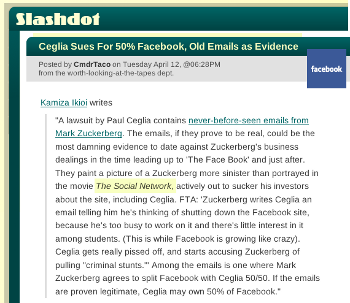 .
.
Ok, that story is not very interesting. The interesting story is that neither Zuckerberg nor Ceglia invented the concepts at the heart of Facebook. Check this story (mp3) about a group of Stanford computer science students who designed and implemented a Facebook prototype, prior art in 1999. The irony is that the Stanford faculty thought it was an invasion of privacy and forced the site off of the web.
This blog post is a good cross reference to this post because it also discusses the marketing strategies at the heart of social networks, such as Facebook.
 .
.Ok, that story is not very interesting. The interesting story is that neither Zuckerberg nor Ceglia invented the concepts at the heart of Facebook. Check this story (mp3) about a group of Stanford computer science students who designed and implemented a Facebook prototype, prior art in 1999. The irony is that the Stanford faculty thought it was an invasion of privacy and forced the site off of the web.
This blog post is a good cross reference to this post because it also discusses the marketing strategies at the heart of social networks, such as Facebook.
Tuesday, April 12, 2011
Julia Sweeney on SexEd
This video was posted to reddit recently.
"I know! It's weird."
Update: 2011-04-13
Of course, you probably remember that Sweeney bared her private life wide open during appearances at the LA improv un-Caberet in the early 1990's. Ira Glass compiled the on-stage monologues and presented them on This American Life. Totally compelling!
Update: 2011-04-29
I think you may be focusing a little too much on the legs. They figure out the legs, okay?
"I know! It's weird."
Update: 2011-04-13
Of course, you probably remember that Sweeney bared her private life wide open during appearances at the LA improv un-Caberet in the early 1990's. Ira Glass compiled the on-stage monologues and presented them on This American Life. Totally compelling!
Update: 2011-04-29
I think you may be focusing a little too much on the legs. They figure out the legs, okay?
Sunday, April 10, 2011
Werner Herzog and Cormac McCarthy on NPR
This week's Science Friday included the segment, Connecting Science and Art. The guests (Werner Herzog, Cormac McCarthy) showed more than casual knowledge in subjects one might consider outside of their normal domains. It was an interesting show, and worth a listen, but Herzog is definitely a fatalist.
p.s. I haven't read or seen McCarthy's work, but Herzog's film work is among the best. He was there on Science Friday to talk mostly about his new documentary:
Cave of Forgotten Dreams.
His other films that should be checked out include:
Documentaries:
Update: 2011-04-20
Terry Gross interviewed Werner Herzog today about the movie, Cave of Forgotten Dreams. The audio is cached here:
1.
2.
3.
Update: 2011-05-01
In the above interview, Terry Gross kept mentioning Aguirre: The Wrath of God. I didn't read anything more about it before getting a copy on Netflix. In the back of my mind, I was supposing it to be another "God's Angry Man." Needless to say, it is Herzog's Heart of Darkness. I have a new blog entry about it here.
Update: 2011-05-09
Film critic Kenneth Turan reviewed Cave of Forgotten Dreams here. (mp3)
p.s. I haven't read or seen McCarthy's work, but Herzog's film work is among the best. He was there on Science Friday to talk mostly about his new documentary:
Cave of Forgotten Dreams.
His other films that should be checked out include:
- Fitzcarraldo, don't miss it!
- Rescue Dawn
Documentaries:
- Encounters at the End of the World, Herzog is not very nice/polite when interviewing scientists. Still, the subject matter is interesting and overcomes Herzog's overtly injected point of view. The film would have won best documentary if he had let the material speak for itself a bit more.
- God's Angry Man, about Gene Scott. The video is online.
- Grizzly Man, about Timothy Treadwell.
Update: 2011-04-20
Terry Gross interviewed Werner Herzog today about the movie, Cave of Forgotten Dreams. The audio is cached here:
1.
2.
3.
Update: 2011-05-01
In the above interview, Terry Gross kept mentioning Aguirre: The Wrath of God. I didn't read anything more about it before getting a copy on Netflix. In the back of my mind, I was supposing it to be another "God's Angry Man." Needless to say, it is Herzog's Heart of Darkness. I have a new blog entry about it here.
Update: 2011-05-09
Film critic Kenneth Turan reviewed Cave of Forgotten Dreams here. (mp3)
Friday, April 8, 2011
A new Rick Roll?
If they say, there's no more room at the bottom, then tell them to look again. When plumbing the depths, Rick Astley is still miles above Rebecca Black.
The parodies were amusing...
This video shut up a lot of the critics, though...
p.s. I'm still stuck on OT7.
The parodies were amusing...
This video shut up a lot of the critics, though...
p.s. I'm still stuck on OT7.
Linux at 20
Twenty years ago (April 1991) Linus Torvalds announced that he had begun development of a simple kernel based on the Intel i386 task switcher. Five months later, he had a usable kernel ready for download. This kernel added the final missing piece to the GNU project. Here is Slashdot's
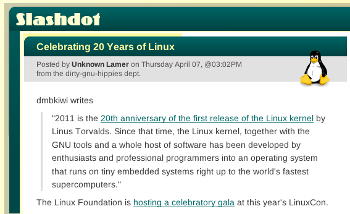 headline.
headline.
The contribution of the GNU toolset should not be minimized, especially its C compiler, because without a compiler, source code projects are mostly academic exercises. The overall synergy of the two projects was magnified further because both employed the same free software license, the GPL. That license enables others to build upon existing work. That broke the cycle of having to reinvent the wheel over and over again, or else pay someone for every single installation. With this solid foundation in place, the stage was set for the rise of the free software movement. This was good timing- it was just in time for GNU/Linux to play a major role in the rise of the nascent internet. Free software, open source software, and other permissive licenses fueled the movement that allowed servers to be setup with software that would otherwise have cost thousands of dollars. Free software forms the basis for very usable software platforms, as typified by LAMP. GNU/Linux lies at the heart of Web 1.0,Web 2.0, and beyond.
GNU/Linux has proven itself on the server side, and is widely deployed (examples: Google, the New York Stock Exchange, and high performance computing installations.) I hadn't realized the extent to which Linux dominates high performance computing. Check this recent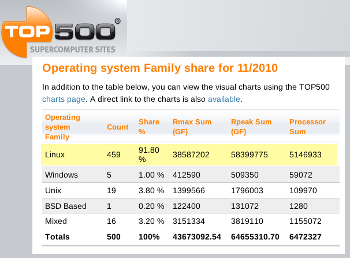 tabulation.
tabulation.
Unfortunately, GNU/Linux has not fared as well on users' desktops. The overall usage percentage of GNU/Linux remains small even though a rich set of software has been developed for it, and for use at no charge. As tight as budgets are right now, it seems that it should be getting more attention. It looks like people would rather continue to pay more than have to learn something new. Schools and governments should consider their long term savings by getting off the never ending upgrade train of commercial software, and own their own home, instead of continuing to rent.
 headline.
headline.The contribution of the GNU toolset should not be minimized, especially its C compiler, because without a compiler, source code projects are mostly academic exercises. The overall synergy of the two projects was magnified further because both employed the same free software license, the GPL. That license enables others to build upon existing work. That broke the cycle of having to reinvent the wheel over and over again, or else pay someone for every single installation. With this solid foundation in place, the stage was set for the rise of the free software movement. This was good timing- it was just in time for GNU/Linux to play a major role in the rise of the nascent internet. Free software, open source software, and other permissive licenses fueled the movement that allowed servers to be setup with software that would otherwise have cost thousands of dollars. Free software forms the basis for very usable software platforms, as typified by LAMP. GNU/Linux lies at the heart of Web 1.0,Web 2.0, and beyond.
GNU/Linux has proven itself on the server side, and is widely deployed (examples: Google, the New York Stock Exchange, and high performance computing installations.) I hadn't realized the extent to which Linux dominates high performance computing. Check this recent
 tabulation.
tabulation.Unfortunately, GNU/Linux has not fared as well on users' desktops. The overall usage percentage of GNU/Linux remains small even though a rich set of software has been developed for it, and for use at no charge. As tight as budgets are right now, it seems that it should be getting more attention. It looks like people would rather continue to pay more than have to learn something new. Schools and governments should consider their long term savings by getting off the never ending upgrade train of commercial software, and own their own home, instead of continuing to rent.
Thursday, April 7, 2011
Cut costs with online education?
The New York Times has an interesting article about moving K-12 education online to save money. The article discusses both the pros and cons, an interesting read.
The current economy has given local school districts a big incentive to cut costs. Giving kids computers to attend online classes is a lot cheaper than local flesh and blood teachers, but the article cites cases where it's not just a win-win for everyone. Specifically, the students can short circuit learning by cutting and pasting answers from wikipedia, and teachers can be overwhelmed with very large virtual class sizes. The net effect is an online school can become a diploma mill, a for-profit diploma mill. In my opinion, the basics of learning still need personal attention, especially in the primary grades. It's not clear that online education is suitable to do that job. That's the downside. On the positive side, students can enroll in courses where there would be too little interest. The online environment seems ideal for that- i.e. allows students to choose advanced or special interest courses. Another good use is when students are living widely dispersed from the school. Online courses would allow studends to "phone" into their classes via broadband links. That would save both the time and the energy costs of busing students. It's a balancing act, for sure.
I last mentioned online education on my blog last October. I had just seen a video presentation about the Open High School of Utah
The current economy has given local school districts a big incentive to cut costs. Giving kids computers to attend online classes is a lot cheaper than local flesh and blood teachers, but the article cites cases where it's not just a win-win for everyone. Specifically, the students can short circuit learning by cutting and pasting answers from wikipedia, and teachers can be overwhelmed with very large virtual class sizes. The net effect is an online school can become a diploma mill, a for-profit diploma mill. In my opinion, the basics of learning still need personal attention, especially in the primary grades. It's not clear that online education is suitable to do that job. That's the downside. On the positive side, students can enroll in courses where there would be too little interest. The online environment seems ideal for that- i.e. allows students to choose advanced or special interest courses. Another good use is when students are living widely dispersed from the school. Online courses would allow studends to "phone" into their classes via broadband links. That would save both the time and the energy costs of busing students. It's a balancing act, for sure.
I last mentioned online education on my blog last October. I had just seen a video presentation about the Open High School of Utah
Tuesday, April 5, 2011
dm-live rescue/boot environment
A few packages from a Slackware base repository can be used to setup a nice rescue or generic boot environment. Simply, build the environment and save in the proper initial ramdisk format using the standard cpio sequence. Next, build a boot disk by combining the bootloader, kernel, the initrd image that is described here. By the way, I use the grub bootloader. I call the resulting environment "dm-live" (device mapper -live) because it relies heavily on device mapper for various modes of operation (booting live-usb's or live-cd's, booting encrypted filesystems, etc.) Note: I have also replaced the standard "init" program, with my own variant.
I will probably move this to its own web page in the future as it "fleshes out." I want to use it to record the packages I used in the environment for each matching Slackware release. For now, here's a graphic showing the relative space used by the environment
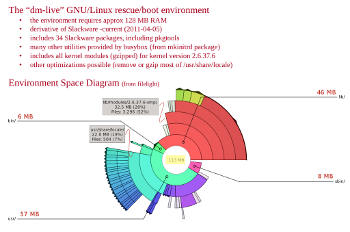 .
.
Update: 2011-04-08
I have updated the packages in this environment to match Slackware -current to this timestamp in the official Slackware change log: Fri Apr 8 06:58:48 UTC 2011
Here is the updated package list.
Update: 2011-04-25
I have updated the packages in this environment to match Slackware -current to this timestamp in the official Slackware change log: Sun Apr 24 03:20:33 UTC 2011
Here is the updated package list. I am also testing with both Slackware compiled kernels: 2.6.37.6 and 2.6.38.4 (with the latter working a bit better. YMMV.)
By the way, this project is an unofficial derivative work based on Slackware Linux.
Slackware is a registered trademark of Patrick Volkerding and Slackware Linux, Inc.
Linux is registered trademark of Linus Torvalds.
I will probably move this to its own web page in the future as it "fleshes out." I want to use it to record the packages I used in the environment for each matching Slackware release. For now, here's a graphic showing the relative space used by the environment
 .
.Update: 2011-04-08
I have updated the packages in this environment to match Slackware -current to this timestamp in the official Slackware change log: Fri Apr 8 06:58:48 UTC 2011
Here is the updated package list.
Update: 2011-04-25
I have updated the packages in this environment to match Slackware -current to this timestamp in the official Slackware change log: Sun Apr 24 03:20:33 UTC 2011
Here is the updated package list. I am also testing with both Slackware compiled kernels: 2.6.37.6 and 2.6.38.4 (with the latter working a bit better. YMMV.)
By the way, this project is an unofficial derivative work based on Slackware Linux.
Trademarks and Copyrights
Slackware is a registered trademark of Patrick Volkerding and Slackware Linux, Inc.
Linux is registered trademark of Linus Torvalds.
Monday, April 4, 2011
Epsilon data breach
Over the weekend, Slashdot reported that a company, epsilon, notified users it had been attacked and suffered a web intrusion into their databases. The intrusion resulted in a data breach. The data that was stolen constituted several million valid email addresses tied to the users' known vendors. This could lead to immediate "phishing" attempts- i.e. the bad guys impersonating the known vendor to trick the user into revealing more account details, etc. Here is Slashdot's
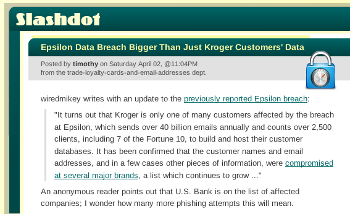 headline.
headline.
I received a notice from Abe Books informing me that their customer list was stolen. It's still to be determined how many different vendors accounts are affected.
 headline.
headline.I received a notice from Abe Books informing me that their customer list was stolen. It's still to be determined how many different vendors accounts are affected.
Sunday, April 3, 2011
...24 little hours
It's that time of year, just like Dinah Washington sang, only in reverse. Yesterday, we were outside enjoying ourselves, and within 24 hours the plants in the yard got yet another winter hammering. The desert willow doesn't look like its going to make it.
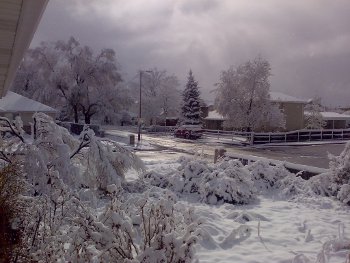 cell phone pic
cell phone pic
Update: 2011-04-30
This is becoming a real weather pattern this year. This has to be adding a lot to the mountain snowpack if we get 6" (15 cm) in the valley:
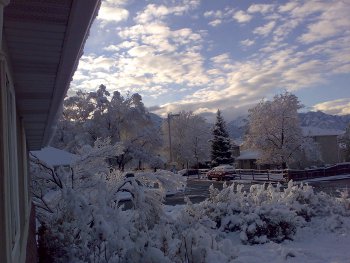 cell phone pic
cell phone pic
 cell phone pic
cell phone picUpdate: 2011-04-30
This is becoming a real weather pattern this year. This has to be adding a lot to the mountain snowpack if we get 6" (15 cm) in the valley:
 cell phone pic
cell phone pic
Friday, April 1, 2011
Hits the proverbial nail...
Yesterday, Diane Rehm interviewed Bernie Sanders, senator from Vermont. They discuss the shift of the center of the political spectrum toward the right. Sanders hits a lot of right notes in this interview- I'd vote for him. He voiced the opposition to extending the Bush era tax cuts; explains the extent to which wealth is being concentrated by the few; the destruction of the middle class; the decimation of the manufacturing labor base; the bailouts for the rich at the expense of the poor; and he doesn't spare our president. Sanders notes how much of missed opportunity we've had with him not living up to the promise for "change." Instead we've gotten a lot more of the same. By postponing taking a stand, we're just catering to the interests of the rich. If you weren't cynical about this country before, then you should be! We were wrong thinking that business doesn't control this country- the Supreme Court drove the point home, just in case we missed it.
Definitely worth listening to.
Update: 2011-05-01
Sanders appeared on the Daily Show with Jon Stewart.
Definitely worth listening to.
p.s.
Socialism never took root in America
because the poor see themselves
not as an exploited proletariat,
but as temporarily embarrassed millionaires.
Update: 2011-05-01
Sanders appeared on the Daily Show with Jon Stewart.
Subscribe to:
Posts (Atom)